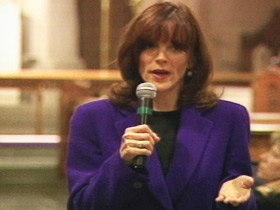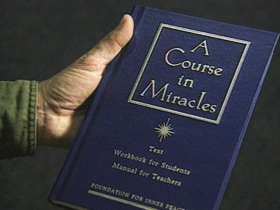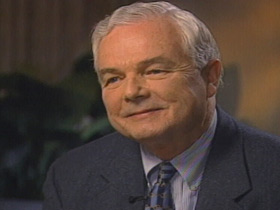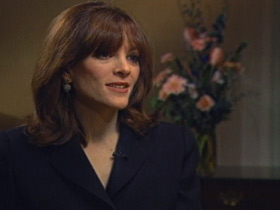Marianne Williamson, Part Two
BOB ABERNETHY: Now, Perspectives: more of our conversation with Marianne Williamson, whose teachings about spirituality have touched millions of seekers and also caused many traditional believers to ask, “What is her appeal?” Marianne Williamson blends Christian ideas and language with eastern philosophy and a hip attitude. She emphasizes direct, personal experiences of the sacred outside any organized religious tradition.
MARIANNE WILLIAMSON (From File Footage): It is ultimately not the belief in God that matters, it is the experience of God that matters. And that is our love of each other.

ABERNETHY: Marianne Williamson was raised a Jew and began spiritual seeking as a child of the 1960s. She found her spiritual answer when she discovered “A Course in Miracles,” a self-study system written by a Columbia University professor who believed Jesus had dictated the words to her. Williamson popularized the course in her 1992 best-seller, A RETURN TO LOVE.
Since then, Williamson’s books and tapes have made her a national celebrity and inspired millions of people, especially those of her generation.
Unidentified Woman: I was on a journey, and she sort of has helped me find what the journey is and where it’s going.
Unidentified Man: Marianne Williamson and her books and her lectures is everything that I think for many of us we wish we would have gotten from church or gotten from our parents.
ABERNETHY: I asked Marianne Williamson to summarize her message and the message of “A Course in Miracles.”

Ms. WILLIAMSON: The course can be summed up very simply in this way: Nothing real can be threatened; nothing unreal exists; herein lies the peace of God. “A Course in Miracles,” which is not a religion, posits that the love in you is what God placed there, and it is your only true eternal reality. There are many of us who should not have to, in any way, apologize for our — the nature or tenor of our religiosity, who do not believe that God is a judgmental God.
So to say that God is not a judgmental God is to not remove the mooring of God’s spirit. You do not have to fear God’s judgment, to feel just as compelled as anyone else to go back to him at every moment, ask his guidance in every moment, atone to him when you have made an error. Seeing God as judgmental is not necessary for a deeply religious perspective and experience in life.
ABERNETHY: What do you mean — what do you think about when you say that word, “God”? Do you mean a personal God?
Ms. WILLIAMSON: I believe that God is an impersonal force, but our relation to him is personal. I think God is the ground of all being. I heard a physicist recently give a talk in which he spoke of the all-nourishing abyss beneath all things. I think of God as first a principle, but most importantly, I think of God as love. And I think that ultimately it is not the belief in God that matters, it is the experience of God that matters. In fact, there’s a line in “A Course in Miracles” which says, “Some people conspire with God who do not yet believe in him.”
To say that you believe in God, I think, it may or may not mean a whole lot. To be willing to forgive other people, to reach out to other people, to bless other people, to see the innocence in other people, to love other people — that, to me, is the experience of God, and I think that’s what matters on the planet, and I think that is what God is asking of us.

ABERNETHY: You are Jewish?
Ms. WILLIAMSON: Yes, I am.
ABERNETHY: You are Jewish. You use a lot of Christian language.
Ms. WILLIAMSON: Yes, absolutely.
ABERNETHY: How do you put those two together?
Ms. WILLIAMSON: It is the mystical heart at the center of all the great religions which fascinates me, which calls to me. And in my own personal religious journey, Christ is there. Now, I almost hesitate to say this on television, because there are Jews who roll their eyes, and there are Christians who roll their eyes like both of them are, like, “Oy.” You know? The Jews are like, “Oy,” and the Christians are like, you know, “We need this.” You know, it’s like, “I understand that,” but there are millions of us who feel that our hearts have gone wherever our hearts have gone. But as far as being a Jew is concerned, you’re born a Jew, you die a Jew.
ABERNETHY: And when you think about the words “Jesus Christ,” what do you think about?
Ms. WILLIAMSON: I feel that there is, deep within you and deep within me and deep within every human being, an essence, which is the truth of who we are, which is that which is created by God himself. It is not just in you identical to that in me, it is that in me. It is literally a oneness — not metaphorically, but literally a oneness, and if you put together that essence, joined together, of every living thing, every human being, one of its names is Jesus.
ABERNETHY: You’ve touched something deep and wide in contemporary America. As you look around and as you listen to people talk, what’s going on?

Ms. WILLIAMSON: I think we’re living in one of the most significant, historical epics — historical moments ever. We are living in a time in which we have come to recognize after centuries the limits as well as the opportunities of the modern world here. The modern worldview, particularly in the last hundred years or so, has riveted, particularly the western mind, outside itself. Our attention has been riveted away from the inner domains, which are the domains of true religion and spirituality, to the outer world. Many people feel that far too often, organized religions, particularly in this country, in fact have been a little too seduced by that materialistic focus. So that many people have felt that in our churches and our synagogues, that we found more talk, more attention on the external aspects, on the hierarchy, on the rules — all the things outside and too little attention to the inner experience of religion. And many of us are beginning to recognize that the worldview which marginalizes the spirit is the worldview that in many cases has gotten us into this trouble.
So a lot of people just aren’t buying it anymore. The best among us are not buying it anymore. Some of the smartest among us are not buying it anymore. So this is a very exciting time.
ABERNETHY: The message of Marianne Williamson. As we reported last week, her latest book urges the application of spiritual energy to politics.

